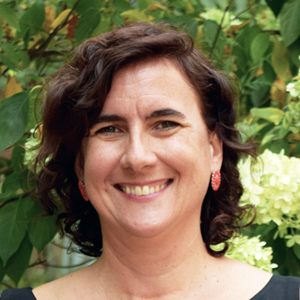Melissa A. Lippold is an associate professor in the School of Social Work and the Prudence and Peter Meehan Early Career Distinguished Scholar at the University of North Carolina at Chapel Hill.
Lippold’s research focuses on parent-child relationships during adolescence and falls into three broad domains. First, she studies the role of parenting in preventing youth risky behavior such as early substance use initiation- an important risk factor for later addiction. Second, she studies how stress is transmitted in families during adolescence and the effects of family-related stress on youth and parent well-being. Lastly, she studies factors that may predict effective parenting during adolescence. Her research has been funded by the National Institute on Drug Abuse and the Eunice Kennedy Shriver National Institute of Child Health and Development.
Lippold is also interested in the design of family-based interventions aimed to improve family relationships and promote youth and parent well-being. She has been involved with the PROSPER project (a large scale effectiveness trial of substance use prevention programs), the Work, Family, Health project (a randomized trial of a workplace intervention to promote employee and family health), and the Strengthening Families program (a family-based substance use prevention program).
She has direct practice experience working with youth and families in a treatment foster care program and applied policy experience conducting research on the child welfare system.
She holds a Ph.D. in Human Development and Family Studies from the Pennsylvania State University as well as a dual Master’s degree in Public Policy and Social Work from The University of Chicago.
Degrees and Licenses
PhD in Human Development and Family Studies, The Pennsylvania State University
MPP Master of Public Policy, The University of Chicago
AM Social Work (MSW equivalent), The University of Chicago
Research and Professional Interests
Family Relationships
Parenting
Adolescence
Substance Use
Stress
Principal Investigator
The Daily Covariation of Salivary Cortisol Between Parents and Their Children
Parenting Lability and Early Adolescent Substance Use
Expanding our Understanding of Parenting Lability and Adolescent Substance Use
Recent Publications
Lippold, M. A., Hussong, A., Fosco, G., & Ram, N. (2018). Lability in the parent’s hostility and warmth towards their adolescent: Linkages to youth delinquency and substance use. Developmental Psychology, 54, 348-361.
Lippold, M. A., Glatz, T., Fosco, G., & Feinberg, M. E. (2018). Parental perceived control and social support: Linkages to change in parenting practices during early adolescence. Family Process, 57, 432-447.
Lippold, M. A. & Jensen, T. (2017). Harnessing the strength of families to prevent social problems and promote adolescent well-being. Children and Youth Services Review, 79, 432-441.
Lippold, M. A., Davis, K., McHale, S., Buxton, O., & Almeida, D. (2016). Daily stressor reactivity during adolescence: The buffering role of parental warmth. Health Psychology, 35, 1027-1035.
Lippold, M. A, McHale, S. M., Davis, K. D., Almeida, D., & King, R. (2016). Experiences with parents and youth physical health symptoms and cortisol: A daily diary investigation. The Journal of Research on Adolescence, 22, 226-240.
Presentations, Workshops and Media
Understanding daily family stress processes. Invited talk at Wake Forest University, Department of Psychology, Winston Salem, NC. September 2019.
Adolescence: A time of opportunity and risks. Child Development for Judges. The University of North Carolina at Chapel Hill, School of Government, November 2018.
The secret to communicating with your teens. Child Trends News Service. Video Forthcoming.
Focus Carolina: Melissa Lippold. WRAL radio interview. By A. Chansky. April 7, 2019.
Moms of teens can benefit from social support, just like new moms. National Public Radio. Story by J. Fraga. July 15, 2017.
Courses
|
Human Behavior in the Social Environment: Infancy through Adolescence
|
|
|
Foundations for Evidence-Based Practice and Program Evaluation
|
|
|
Evaluation of Social Work Interventions
|
|


